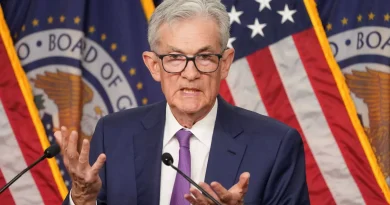Swiss government proposes tough new capital rules in major blow to UBS
A sign in German that reads “part of the UBS group” in Basel on May 5, 2025.
Fabrice Coffrini | AFP | Getty Images
The Swiss government on Friday proposed strict new capital rules that would require banking giant UBS to hold an additional $26 billion in core capital, following its 2023 takeover of stricken rival Credit Suisse.
The measures would also mean that UBS will need to fully capitalize its foreign units and potentially carry out fewer share buybacks.
“The rise in the going-concern requirement needs to be met with up to USD 26 billion of CET1 capital, to allow the AT1 bond holdings to be reduced by around USD 8 billion,” the government said in a Friday statement, referring to UBS’ holding of Additional Tier 1 (AT1) bonds.
The measures therefore amount to an additional $26 billion in core capital but a requirement of just $18 billion in new capital. This is $2 billion lower than the $20 billion estimated by JP Morgan earlier this week.
UBS shares jumped 6% following the announcement and ended Friday’s trading session 3.8% higher.
The Swiss bank will become more stable and attractive in areas such as asset management, Swiss Finance Minister Karin Keller-Sutter said during a press briefing on Friday. “I don’t believe that the competitiveness will be impaired, but it is true that growth abroad will become more expensive,” she said in comments reported by Reuters.
UBS said while it supports “in principle” most of the regulatory proposals announced on Friday, it strongly disagrees with the “extreme” increase in capital requirements. Based on the bank’s first-quarter results, its CET1 capital ratio target of between 12.5% and 13% — along with previously communicated capital — the firm said it would be required to hold around $42 billion in additional CET1 capital in total.
The bank maintained its target of achieving an underlying return on CET1 capital of around 15% and also reaffirmed its capital return intentions for the year.
“UBS will actively engage in the consultation process with all relevant stakeholders and contribute to evaluating alternatives and effective solutions that lead to regulatory change proposals with a reasonable cost/benefit outcome. UBS will also evaluate appropriate measures, if and where possible, to address the negative effects that extreme regulations would have on its shareholders,” the bank said.
Johann Scholtz, senior equity analyst at Morningstar, noted that the news was “as bad as it will get for UBS.”
The banking giant “can now lobby for some concessions and take some actions themselves to mitigate impact, for instance upstream some excess capital from its subsidiaries,” Scholtz said. He added that while negotiations will start immediately, there will be a long-phase out for UBS to deploy the measures, with the earliest that it will apply in full being 2034.
JPMorgan analysts led by Kian Abouhossein also stressed that a long lead time of six to eight years for UBS to fulfil the deduction of investments in its foreign…






